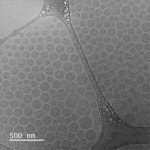Vanderbilt researchers have developed a set of nanoparticles that stimulate the immune system in mice to fight cancer and may eventually do the same in humans.

The research led by John T. Wilson, associate professor of chemical and biomolecular engineering and biomedical engineering, was recently published in ACS Nano.
Working with collaborators at Yale University, Wilson and his team designed lipid nanoparticles - the tiny balls of fat behind the success of mRNA vaccines - to deliver a nucleic acid molecule that triggers an anti-tumor immune response.
The nucleic acid stimulates the retinoic acid inducible gene I, or RIG-I, pathway that is normally used by the body to recognize foreign viruses, such as influenza, to help the immune system mount a defense, according to the researchers. By packaging this molecule into lipid nanoparticles to improve its delivery to the cytosol of cells, the researchers were able to strongly activate the RIG-I pathway, triggering the immune system to focus its attention on killing cancer cells in mouse models of breast cancer and melanoma.

"RIG-I is commonly activated to help the body combat viral infections and there is compelling evidence that this same pathway can be harnessed to stimulate the immune system to fight cancer," said Wilson, a Chancellor Faculty Fellow.
While much work remains before such technology can be advanced to treat human cancers, the authors noted that lipid nanoparticles have already been administered to millions of people who have received the COVID-19 mRNA vaccine and that other drugs that activate RIG-I have advanced into clinical trials, creating a potential path to clinical testing.
"We observed very nice responses even without doing a lot of optimization to the system, and so this sets the stage for future work to develop technologies that can do this even more effectively and also safely," Wilson said.
The research was funded by the Congressionally Directed Medical Research Programs (CDMRP), an appropriation of funds the U.S. Department of Defense awards to researchers for projects that focus on advancements in military medicine and public health benefits for areas such as cancers and substance abuse.






